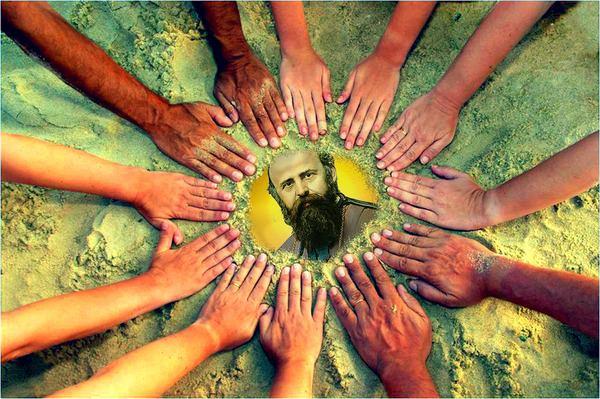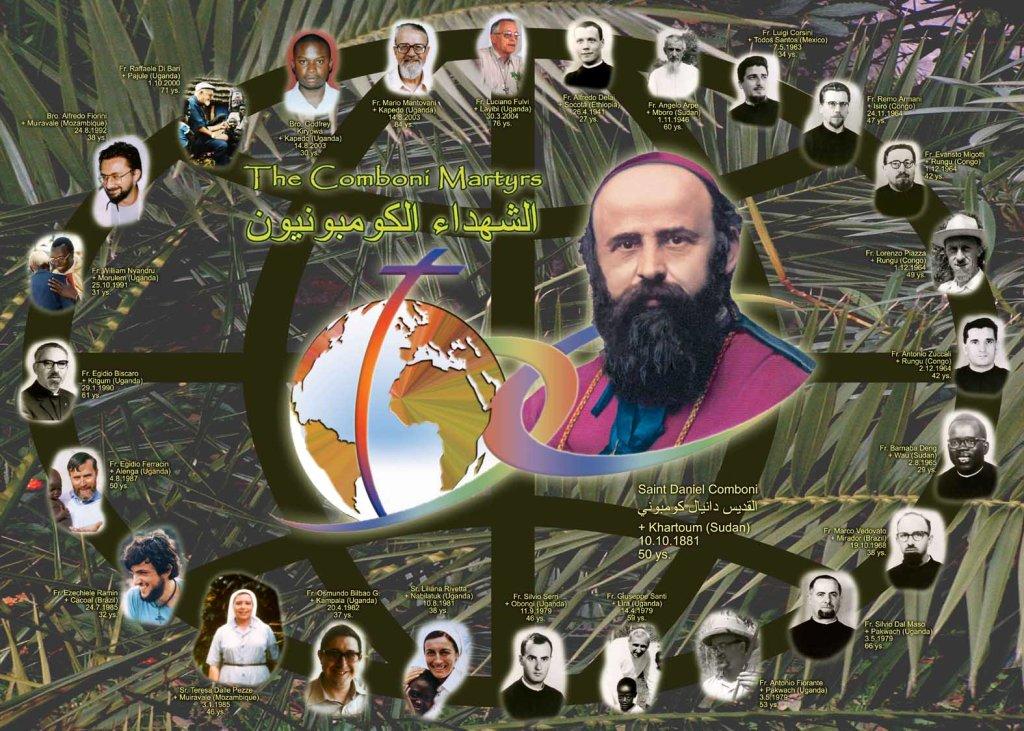Daniel Comboni
Comboni Missionaries
Institutional area
Other links
Newsletter
"The missionary must be ready for anything: joy and sadness, life and death, embrace and rejection: Our life is a mixture of pain and gladness, of woes and hopes, of sufferings and comforts"
"My missionaries, my five Verona Sisters (they are real angels), my craftsmen and I are happiest people on earth, because we are all in the hands of God, of Mary and of good St. Joseph"
 In the liturgy of the day of his Beatification in St. Peter's on 17 March 1996 we find: "Daniel Comboni: the son of poor gardeners who became the first Catholic Bishop of Central Africa and one of the greatest missionaries in the history of the Church [...]. It is indeed true: when the Lord decides to intervene, and finds someone who is generous and ready, new and great things are seen..."
In the liturgy of the day of his Beatification in St. Peter's on 17 March 1996 we find: "Daniel Comboni: the son of poor gardeners who became the first Catholic Bishop of Central Africa and one of the greatest missionaries in the history of the Church [...]. It is indeed true: when the Lord decides to intervene, and finds someone who is generous and ready, new and great things are seen..."
How can such a full and productive life be explained? In the grace of Christ, welcomed in full freedom. Christ came to Comboni through an uninterrupted series of encounters and circumstances that shaped his life. He always responded with wonder and alacrity. He also received a very specific charisma for Mission. All this generated in him a specific Christian experience that is the basis of any missionary activity (John Paul II, Redemptoris Missio, 87). Comboni was one of the fathers of the missionary movement in the 19th century, but before that he was a faithful son of the holiest men and women of the Church of his time. He had friendships and correspondence with almost a score of persons who are now canonised Saints, and from whom he wished "to learn Christ continuously". One of them, the German Fr. Arnold Janssen (+1909), Founder of the Divine Word Missionaries, will be canonised with him. Another great Bishop, Guido Maria Conforti (+1931), who founded the Xaverian Missionaries and took Comboni as a model, was Beatified with him.
 Comboni wrote in the Rule for his missionaries (1871) that only a missionary who has "his eyes fixed constantly on Christ" can be part of the foundation of a missionary undertaking for the glory of God. His missionary vocation was not born of sentiment or based on empty ideology. It was a fact, that took place in concrete circumstances, through encounters and intense interpersonal relationships. From his vast correspondence one gets a surprising feeling of the wonder with which he lived all these encounters throughout his life.
Comboni wrote in the Rule for his missionaries (1871) that only a missionary who has "his eyes fixed constantly on Christ" can be part of the foundation of a missionary undertaking for the glory of God. His missionary vocation was not born of sentiment or based on empty ideology. It was a fact, that took place in concrete circumstances, through encounters and intense interpersonal relationships. From his vast correspondence one gets a surprising feeling of the wonder with which he lived all these encounters throughout his life.
Love is always a total, free and emotional gift of oneself. In this gift of himself, Comboni was clearly convinced that a person can only be reborn through the embrace of Christ: any person, even those in the most degrading and desperate situations, mistreated by history and by others. That is why Comboni continuously mentions the need to "gaze on Christ" without interruption; because everything can be referred explicitly to Christ to discover its true substance. As soon as Pius IX entrusted the mission of Central Africa to him in 1872, he decided to consecrate it to the Heart of Jesus, and to do so in the place where one of the greatest degradations of Africa was taking place: the town of El Obeid in Sudan, that had a great slave market at its centre. At the heart of this abomination he founded a Mission and built a church dedicated to Our Lady, Queen of Africa. Within a short time he dedicated Africa to Our Lady, in the same place. He deliberately made the place of degradation and evil into a starting point for the true liberation and development of the human person, and highlighting what gives soundness to every missionary action: Christ, given to us through Mary. There is a large mosaic in the apse of El Obeid Cathedral: Mary who offers her Son to Africa and, kneeling at her feet Daniel Comboni and Saint Josephine Bakhita, a slave from that area, ransomed in Sudan. They are praying together for Africa. Two years after his death, five of Comboni's followers died here in the turmoil of the Mahdist revolution.
 “For Daniel Comboni," writes Cardinal Francis Arinze, "consumed by the longing to share the Good News of Jesus Christ with all Africans, the evangelisation of the African continent was the business of the whole Church [...]. In Comboni's time, many thought of Africa as an objective for exploration, for taking over, sharing out and dominating. Others dreamed of an Africa to help, civilise and educate. They all looked at Africa as an object, not a subject. Comboni thought differently". He wanted an Africa in which the fulness of the face of Christ would shine forth. His direct successor in Sudan, Archbishop Gabriel Zubeir of Khartoum writes: "We African Catholics are sons and daughters of Daniel Comboni. Without him, there would not be Bishops, priests, deacons, brothers, nuns, Catholic faithful [...]. But his missionary effort was not born from a merely outward project; it was the fruit of his ecclesial obedience to the Grace of the Holy Spirit”. That is why, in the last supreme trial, moments before his death, he was able to proclaim to his missionaries: "I am dying, but the Work [the African Mission] will not die!" One of his frequent sayings was: "The works of God are born at the foot of the Cross".
“For Daniel Comboni," writes Cardinal Francis Arinze, "consumed by the longing to share the Good News of Jesus Christ with all Africans, the evangelisation of the African continent was the business of the whole Church [...]. In Comboni's time, many thought of Africa as an objective for exploration, for taking over, sharing out and dominating. Others dreamed of an Africa to help, civilise and educate. They all looked at Africa as an object, not a subject. Comboni thought differently". He wanted an Africa in which the fulness of the face of Christ would shine forth. His direct successor in Sudan, Archbishop Gabriel Zubeir of Khartoum writes: "We African Catholics are sons and daughters of Daniel Comboni. Without him, there would not be Bishops, priests, deacons, brothers, nuns, Catholic faithful [...]. But his missionary effort was not born from a merely outward project; it was the fruit of his ecclesial obedience to the Grace of the Holy Spirit”. That is why, in the last supreme trial, moments before his death, he was able to proclaim to his missionaries: "I am dying, but the Work [the African Mission] will not die!" One of his frequent sayings was: "The works of God are born at the foot of the Cross".




